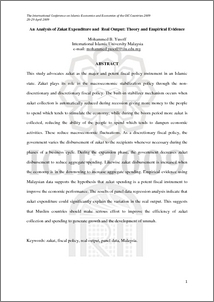Yusoff, Mohammed
(2009)
An analysis of Zakat expenditure and real output: theory and empirical evidence.
In: The International Conference on Islamic Economics and Economies of the OIC Countries 2009 (ICIE2009) , 28-29 April, 2009, Kuala Lumpur.
![[img]](http://irep.iium.edu.my/style/images/fileicons/application_pdf.png)  Preview |
|
PDF (An analysis of Zakat expenditure and real output: theory and empirical evidence)
- Accepted Version
Download (410kB)
| Preview
|
Abstract
This study advocates zakat as the major and potent fiscal policy instrument in an Islamic state. Zakat plays its role in the macroeconomic stabilization policy through the non
-discretionary and discretionary fiscal policy. The built
-in stabilizer mechanism occurs when zakat collection is automatically reduced during recession giving more money to the people to spend which tends to stimulate the economy; while during the boom period more zakat is collected, reducing the ability of the people to spend which tends to dampen economic activities. These reduce macroeconomic fluctuations. As a discretionary fiscal policy, the government varies the disbursement of zakat to the recipients whenever necessary during the phases of a business cycle. During the expansion phase, the government decreases zakat disbursement to reduce aggregate spending. Likewise zakat disbursement is increased when the economy is in the downswing to increase aggregate spending. Empirical evidence using Malaysian data supports the hypothesis that zakat spending is a potent fiscal instrument to improve the economic performance. The results of panel data regression analysis indicate that zakat expenditure could significantly explain the variation in the real output. This suggests that Muslim countries should make serious effort to improve the efficiency of zakat collection and spending to generate growth and the development of ummah
Actions (login required)
 |
View Item |


 Download Statistics
Download Statistics Download Statistics
Download Statistics